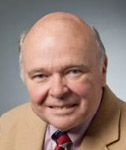The Volunteer Who Codified the “Ten Stages of Genocide” — Gregory Stanton (Ivory Coast)
by Jeremiah Norris (Colombia, 1963-65)
•

Gregory Stanton
From 1969 to 1971 Gregory H. Stanton served as a Peace Corps Volunteer in the Ivory Coast. From there, he went on to be the Church World Service/CARE’s Field Director in Cambodia.
From 1985 to 1991, Gregory was a Professor of Law at Washington and Lee University, and a Fulbright Professor at the University of Swaziland. In this time period, he also was a Professor of Justice, Law, and Society at the University of Mary Washington in Fredericksburg, Virginia.
Gregory was the Chair of the American Bar Association’s Young Lawyer’s Division Committee on Human Rights and a Member of its Standing Committee on World Order, serving as Legal Advisor to the Ukrainian Independence Movement from 1988-1992. He was named the Ukrainian Man of the Year in 1992 by the UI Movement.
In 1991, he founded the Cambodian Genocide Project at Yale University, initiating an international force which eventually brought the Khmer Rouge to justice.
During the period 1992-1999, he worked at the U. S. Department of State where he drafted the United Nations Security Council’s resolutions that eventually created the International Criminal Tribunal for Rwanda; the Burundi Commission of Inquiry; and the Central African Arms Flow Commission. Gregory drafted the U. N. Peacekeeping Operations Resolution that helped bring about an end to the Mozambican Civil War.
In 1994, he won the American Foreign Service Association’s W. Averell Harriman Award for “extraordinary contributions to the practice of exemplifying intellectual courage,” based on his dissent from U. S. policy on the Rwandan genocide during the Clinton Administration.
While at the State Department, Gregory wrote option papers on ways to bring the Khmer Rouge to justice in Cambodia. He was deeply involved in the U. N. /Cambodian government negotiations that brought about the creation of the Khmer Rouge Tribunal for which he drafted its internal rules of procedure.
Gregory is best known for his authorship of “The Ten Stages of Genocide,” a model of the genocidal process that the State Department and the UN have used in predicting and taking steps to prevent genocide. His “Ten Stage Model” is used in courses on genocide in schools and colleges around the world. In 1999, he founded Genocide Watch, a non-governmental organization campaigning against genocide, and from that year through 2000, he also served as co-chair of the Washington Working Group for the International Criminal Court.
In 2004, Gregory published a proposal to establish an Office for Genocide Prevention at the UN. With other members of the International Campaign to End Genocide, he met with UN officials to lobby for the proposed office. That same year, in Stockholm, then-Secretary General Kofi Annan announced the Office of the UN Special Advisor for the Prevention of Genocide.
In 2019, Gregory retired from his positions as the Research Professor in Genocide Studies and Prevention at the School for Conflict Analysis and Resolution at George Mason University in Virginia. Among his many academic awards and degrees, he has been a Law Professor at Washington and Lee University, American University, and the University of Swaziland. He has degrees from Oberlin College, Harvard Divinity School, Yale Law School, and a Doctorate in Cultural Anthropology from the University of Chicago. Somehow, he also managed to include in his activities a Fellowship at the Woodrow Wilson International Center for Scholars in 2001-2002.
The Tenth Step
Of “The Ten Steps of Genocide,” the 10th step is the most consequential: Denial, “when a government denies it has committed any crime, that’s among the surest indicators of further genocidal massacres”.
For many, the subject of genocide first emerged into public awareness during the Armenian Genocide of 1915–1923, but for several decades afterwards, the government of Turkey denied its very existence and its own involvement in a genocide. In deference to that government’s continuing denial, many other countries followed suit and refused to hold it responsible, including the U. S.
Then there was the Holocaust during WW II that propelled the concept of “industrialized genocide” into rapt global attention, rendering ‘denial’ moot. It is where then meets now, of an offense that no one has ever been able to grasp its incurable nature.
With appreciation to Gregory’s seminal undertakings on genocide, the response to denial is punishment by an international tribunal or national courts, such as those he helped to establish, such as the Rwanda Tribunal. These tribunals may not deter the worst genocidal killers, but with political will, he has proved that some may be brought to justice and when they are, there is a globally recognized model that has served to codify the genocidal process and it can be deployed to establish guilt and punishment. Creation of the Khmer Rouge Tribunal on Cambodia is a good example of his Ten Stage Model now used in courses on genocide in schools and colleges around the world.
For these accomplishments, Gregory has rightly earned a Profile in Citizenship.
•
No comments yet.
Add your comment